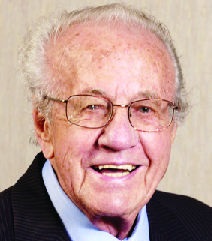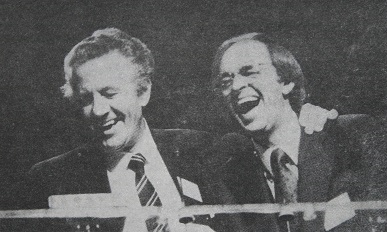By Bob Allen
Two-time failed Southern Baptist Convention presidential candidate Winfred Moore — a Texas pastor who ran on a centrist platform aimed at depoliticizing the denomination in the 1980s — died May 8 in Amarillo, Texas. He was 95.
 Moore, pastor of Amarillo’s First Baptist Church from 1959 until his retirement in 1989, was nominated as president of the nation’s second-largest faith group in 1985 and 1986. Though backed by the so-called “moderates” in the era known as the “conservative resurgence,” Moore described himself as a “conservative” and “denominational loyalist” who was opposed to tactics of the resurgence group organized by layman Paul Pressler and theologian Paige Patterson in 1979.
Moore, pastor of Amarillo’s First Baptist Church from 1959 until his retirement in 1989, was nominated as president of the nation’s second-largest faith group in 1985 and 1986. Though backed by the so-called “moderates” in the era known as the “conservative resurgence,” Moore described himself as a “conservative” and “denominational loyalist” who was opposed to tactics of the resurgence group organized by layman Paul Pressler and theologian Paige Patterson in 1979.
Elected president of the Baptist General Convention of Texas in 1984 and 1985, Moore lost in 1985 to incumbent SBC President Charles Stanley. Stanley, pastor of First Baptist Church in Atlanta, was the fourth consecutive president committed to appointing only like-minded leaders in an effort to ensure that convention entities over time would reflect the conservative values embraced by many churches.
Moore received 19,795 votes — more than the total number of messengers at the 1984 convention in Kansas City — but he still lost by 10 percent at the convention in Dallas, which set a record registration of 45,519.
After the vote reporters surrounded Moore at the foot of the stage. He heard Stanley interrupt to ask him to return to the platform, where Stanley asked him if he was willing to be nominated as first vice president. Unaware that two other candidates had already been nominated, Moore put his arm around Stanley’s shoulder and asked, “Are you asking me that?”
 Stanley did not answer audibly but smiled broadly. “I will do with Charles Stanley everything that I know how to do to put the convention back in the mainstream of evangelism and missions,” Moore continued in a rare light moment in an otherwise tense convention.
Stanley did not answer audibly but smiled broadly. “I will do with Charles Stanley everything that I know how to do to put the convention back in the mainstream of evangelism and missions,” Moore continued in a rare light moment in an otherwise tense convention.
The following year Moore lost to Adrian Rogers, pastor of Bellevue Baptist Church in Memphis, Tenn., the first conservative resurgence president who served in 1979-1980 before turning down a customary second term. Rogers’ second election secured nine straight years of conservative presidents in what Pressler and Patterson had estimated could be accomplished in 10 years.
After his election as first vice president in 1985, Moore was added as an ex-officio member to the SBC Peace Committee, a group formed at the Dallas convention to determine the causes of controversy dividing Southern Baptists and make recommendations about how to solve them.
Moore said in December 1985 he believed the Peace Committee was off to a good start, but after the committee issued its final report in 1987, he was concerned enough to convene a meeting of 42 leaders at the Dallas-Fort Worth airport who were “fed up with fundamentalist control of the SBC.”
In 1988 Moore backed SBC presidential candidate Richard Jackson with a mailing to 34,000 Southern Baptist churches describing the upcoming convention in San Antonio, Texas, as possibly “the most important for missions and evangelism in our history.” Jackson, pastor of North Phoenix Baptist Church in Phoenix, Ariz., lost by 692 votes to Jerry Vines, co-pastor of First Baptist Church in Jacksonville, Fla., the closest race in a decade.
That December Moore was announced as first chairman of a new coalition called Baptists Committed to the Southern Baptist Convention, led by rancher and former pastor David Currie to organize the “broad center” of Southern Baptists “who are disenchanted with the fundamentalist takeover of the convention and yet do not wish to abandon the convention or start a new denomination.”
After the Cooperative Baptist Fellowship formed in 1990, the group dropped the reference to the SBC from its name. Renamed Texas Baptists Committed, the group shifted focus to resisting fundamentalism in the Baptist General Convention of Texas.
Currie stepped down in 2009. Bill Jones, the former associate executive director, was promoted to executive director in January 2013. Texas Baptists Committed no longer endorses candidates, focusing instead on education and advocacy of historic Baptist principles in cooperation with the BGCT.
After retiring from the pulpit, Moore joined the faculty of Baylor University, where he had served on the board of regents and as chairman from 1986 until 1990. In 1997 he was named first director of the Center for Ministry Effectiveness. He was on the founding board of Baylor’s George W. Truett Theological Seminary, and two endowed scholarships at Baylor bear his name.
Moore and his wife, Elizabeth, returned to Amarillo about 10 years ago. She died in 2012. They were married 71 years.
Moore’s last place of residence was Park Place Towers Retirement Center, located across the street from First Baptist Church, which he was instrumental in raising funds to build in the early 1980s.
A memorial service for Moore was scheduled May 11 at First Baptist Church in Amarillo with Pastor Howard Batson officiating, followed by a private family interment at Llano Cemetery.
The family suggested memorial gifts to Buckner Foundation, Amarillo Program, 600 N. Pearl St. Suite 2000 Dallas, Texas, 75201; Winfred and Elizabeth Moore Scholarship Fund, in care of Baylor University, One Bear Place, No. 97026, Waco, Texas, 76798, or Snack Pak4Kids c/o Baptist Community Services, Amarillo, or First Baptist Church.
